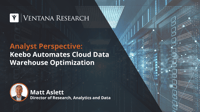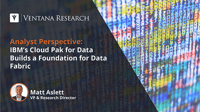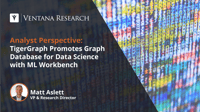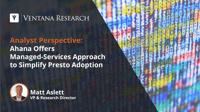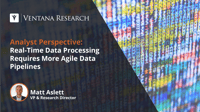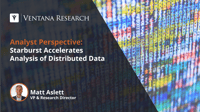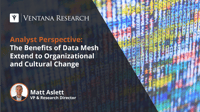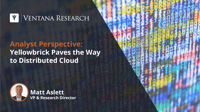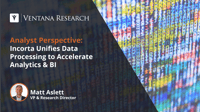In recent years, many enterprises have migrated data platform workloads from on-premises infrastructure to cloud environments, attracted by the promised benefits of greater agility and lower costs. The scale of cloud data platform adoption is illustrated by Ventana Research’s Data Lakes Dynamic Insights research: For two-thirds (66%) of participants, the primary data platform used for analytics is cloud based. As the quantity and importance of the data platform workloads deployed in the cloud...
Read More
Topics:
business intelligence,
Cloud Computing,
data operations,
AI & Machine Learning,
robotic automation,
Analytics & Data,
analytic data platforms
I have written recently about the similarities and differences between data mesh and data fabric. The two are potentially complementary. Data mesh is an organizational and cultural approach to data ownership, access and governance. Data fabric is a technical approach to automating data management and data governance in a distributed architecture. There are various definitions of data fabric, but key elements include a data catalog for metadata-driven data governance and self-service, agile data...
Read More
Topics:
business intelligence,
Cloud Computing,
Data Governance,
Data Management,
Data,
data operations,
AI & Machine Learning,
operational data plaftforms
I recently wrote about the growing range of use cases for which NoSQL databases can be considered, given increased breadth and depth of functionality available from providers of the various non-relational data platforms. As I noted, one category of NoSQL databases — graph databases — are inherently suitable for use cases that rely on relationships, such as social media, fraud detection and recommendation engines, since the graph data model represents the entities and values and also the...
Read More
Topics:
business intelligence,
Analytics,
Cloud Computing,
Data,
Digital Technology,
AI & Machine Learning,
Data Platforms,
Analytics & Data
I previously described the concept of hydroanalytic data platforms, which combine the structured data processing and analytics acceleration capabilities associated with data warehousing with the low-cost and multi-structured data storage advantages of the data lake. One of the key enablers of this approach is interactive SQL query engine functionality, which facilitates the use of existing business intelligence (BI) and data science tools to analyze data in data lakes. Interactive SQL query...
Read More
Topics:
business intelligence,
Analytics,
Cloud Computing,
Data,
Digital Technology,
data lakes,
data operations,
AI & Machine Learning,
Data Platforms,
Analytics & Data
I recently wrote about the importance of data pipelines and the role they play in transporting data between the stages of data processing and analytics. Healthy data pipelines are necessary to ensure data is integrated and processed in the sequence required to generate business intelligence. The concept of the data pipeline is nothing new of course, but it is becoming increasingly important as organizations adapt data management processes to be more data driven.
Read More
Topics:
business intelligence,
Analytics,
Data Governance,
Data Integration,
Data,
Digital Technology,
Digital transformation,
data lakes,
data operations,
AI & Machine Learning,
Digital Business,
Data Platforms,
Analytics & Data,
Streaming Data & Events
I recently described the growing level of interest in data mesh which provides an organizational and cultural approach to data ownership, access and governance that facilitates distributed data processing. As I stated in my Analyst Perspective, data mesh is not a product that can be acquired or even a technical architecture that can be built. Adopting the data mesh approach is dependent on people and process change to overcome traditional reliance on centralized ownership of data and...
Read More
Topics:
Business Continuity,
business intelligence,
Analytics,
Data Governance,
Data Integration,
Data,
Digital Technology,
data lakes,
Digital Business,
Data Platforms,
Analytics & Data
Data mesh is the latest trend to grip the data and analytics sector. The term has been rapidly adopted by numerous vendors — as well as a growing number of organizations —as a means of embracing distributed data processing. Understanding and adopting data mesh remains a challenge, however. Data mesh is not a product that can be acquired, or even a technical architecture that can be built. It is an organizational and cultural approach to data ownership, access and governance. Adopting data mesh...
Read More
Topics:
business intelligence,
Analytics,
Data Governance,
Data Integration,
Data,
Digital Technology,
Digital transformation,
data lakes,
data operations,
Digital Business,
Data Platforms,
Analytics & Data,
Streaming Data & Events
Despite widespread and increasing use of the cloud for data and analytics workloads, it has become clear in recent years that, for most organizations, a proportion of data-processing workloads will remain on-premises in centralized data centers or distributed-edge processing infrastructure. As we recently noted, as compute and storage are distributed across a hybrid and multi-cloud architecture, so, too, is the data it stores and relies upon. This presents challenges for organizations to...
Read More
Topics:
business intelligence,
Analytics,
Data Governance,
Data,
data operations,
AI & Machine Learning,
Data Platforms
As I stated when joining Ventana Research, the socioeconomic impacts of the pandemic and its aftereffects have highlighted more than ever the differences between organizations that can turn data into insights and are agile enough to act upon it and those that are incapable of seeing or responding to the need for change. Data-driven organizations stand to gain competitive advantage, responding faster to worker and customer demands for more innovative, data-rich applications and personalized...
Read More
Topics:
business intelligence,
Analytics,
Data Integration,
Data,
data lakes,
data operations,
AI & Machine Learning,
Data Platforms,
Streaming Data & Events
